Even during the open-world genre’s earliest days when developers were forced to rely on smoke and mirrors to make their visions come to life, the very concept of open-world gaming always felt like the future of the medium. The idea of being left to your own devices in a massive digital world where nearly anything was possible was one of those things we used to only be able to dream about. Now, you find variations of that concept in many of the best modern blockbuster titles.
“Variations” is certainly a word worth keeping in mind when you’re thinking about the history of open-world games and what separates the good ones from the bad ones and great ones. Conventional wisdom once told us that open-world games would only get better as technology improved and the size of those worlds grew. While that has sometimes been the case, there are some older or smaller open-world titles that showcase the ways a singular creative vision can often feel bigger than even the technically biggest open worlds. The one thing that tends to matter most in open-world games is whether or not they offer a world you simply want to lose yourself in.
So before we dive into this list, please consider a few of the rules we used to help determine our selections and their rankings:
- Some games exist on the fringes of the “open-world” genre. While we initially considered various games that offer a large area that you’re able to explore with some degree of freedom, certain “large-world” or structurally segmented games were ultimately excluded from further consideration.
- An open-world title’s “fun factor,” historical significance, and the ways it uses its world to provide an experience that wouldn’t be possible in other formats were all major factors that helped determine whether or not a game made this list and where it ranked.
- Finally, there is a “one entry per franchise” rule in place for this list. That makes it easier to separate entries in certain franchises that offer relatively similar experiences as well as shine a light on a few games that don’t always get the love they deserve when compared to the titles in juggernaut open-world franchises like Grand Theft Auto and The Elder Scrolls.
With that out of the way, here are the 25 best open-world games ever made:

25. Just Cause 4
The Just Cause franchise thrives on its physics-based open-world sandbox gameplay. While each entry encourages players to blow up enemy outposts in creative ways, Just Cause 4 makes the most out of more modern technology to really up the ante (even if some of the game’s structured missions don’t quite live up to the standards set by its free-roaming activities). The latest game in the series gives players an arsenal of weapons (including a utility belt full of special grappling cables and booster rockets) that allow them to manifest their destructive imaginations like never before.
Other open-world games let players pilot tanks and helicopters, but only Just Cause 4 lets gamers shoot a tank into the air with rockets and balloons, then dive out of it so that they can seamlessly hijack a helicopter. The more creative the player, the more fun they’ll have in this all-time great digital sandbox. – Aaron Greenbaum
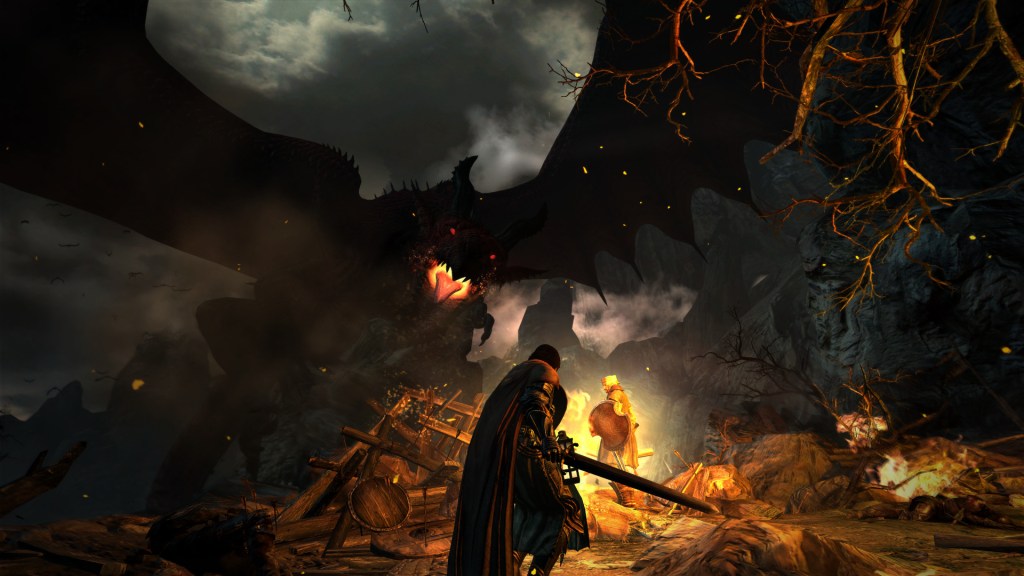
24. Dragon’s Dogma
Dragon’s Dogma is sometimes best thought of as what might happen if Capcom took the giant creatures from Monster Hunter and placed them in a large medieval fantasy RPG. What makes that already appealing experience really work are the ways that this game gives you free rein to tackle combat pretty much however they see fit. Sure, you can rely on the same kinds of abilities and attacks found in other hack-and-slash titles, but Dragon’s Dogma also lets you do things like grapple smaller creatures and climb over bigger monsters to hit different weak spots. Exploration in this game certainly isn’t limited to discovering new locations.
Many of the systems created for Dragon’s Dogma (such as the player-built Pawn allies that others can recruit) have yet to properly appear in other games. While it’s a little sad that Dragon’s Dogma‘s best ideas haven’t found their way to more titles, the lack of suitable copycats ensures that Dragon’s Dogma remains unique and special. – AG

23. Sleeping Dogs
I’ll never know why there aren’t more truly great martial arts games, but I do know that whenever I find myself lamenting the lack of noteworthy entries into that subgenre, I can always turn to Sleeping Dogs for comfort.
Sleeping Dog‘s action steals the show in a way that you just don’t see in a lot of open-world games. Its intense shootouts and incredible fistfights are bolstered by a shockingly strong story that shouldn’t be slept on (tee-hee). Every aspect of the game feels like it was crafted with love and respect for its inspirations (most notably, the very best Hong Kong action films). This isn’t the biggest open-world game, but it might be the open-world game with the biggest heart. – Matthew Byrd

22. Microsoft Flight Simulator
Microsoft Flight Simulator lives up to its name by simulating the thrill of flying in a way that still makes the process feel magical. Players can pilot a variety of planes across a real-time simulation of the planet. If the weather report says it’s raining in Toronto, then Microsoft Flight Simulator lets gamers fly a plane through the storm or avoid it. The game even includes a variety of options to make each flight as arcadey or realistic as players want.
While Microsoft Flight Simulator provides several missions, the heart of the experience is still the (mostly) relaxing activity of flying. Experiences like buzzing by your own house in a Boeing 747 make Microsoft Flight Simulator a unique example of how to best use a truly massive in-game world. – AG

21. Borderlands 2
Looter shooters can be surprisingly difficult to get right, but Borderlands 2 downright perfected the formula. The game offers a sprawling, cel-shaded world packed with glorious loot. Every nook and cranny hides a new mission, boss, or something entirely unexpected like a talking shotgun. Discovering those things is always fun, but the game is truly brought to life by its cast of memorable characters who have birthed iconic memes and phrases. Even when the loop of shooting various bad guys for fun and profit grows stale, the game makes it easy to team up with friends for extra challenges and rewards.
Borderlands 2 set the standard that all future looter shooters would be judged by and happened to deliver one of the absolute funniest video game scripts ever written in the process. – AG

20. Marvel’s Spider-Man
It wasn’t long ago that you’d occasionally see 2004’s Spider-Man 2 somewhere towards the bottom of a list of the best open-world games. While that title is rightfully remembered for its web-slinging navigation system that let you feel like a true superhero, it was also burdened by quite a few problems and half-realized ideas.
Thankfully, Marvel’s Spider-Man delivers a Spider-Man experience that recreates the thrills of Spider-Man 2’s open-world web-slinging while offering so much more in every other area. Indeed, the only thing better than swinging around this game’s lavish open world is experiencing the wonderful original Spider-Man story that the talented folks at Insomniac Games were allowed to tell. It truly is the definitive Spider-Man video game experience. – MB
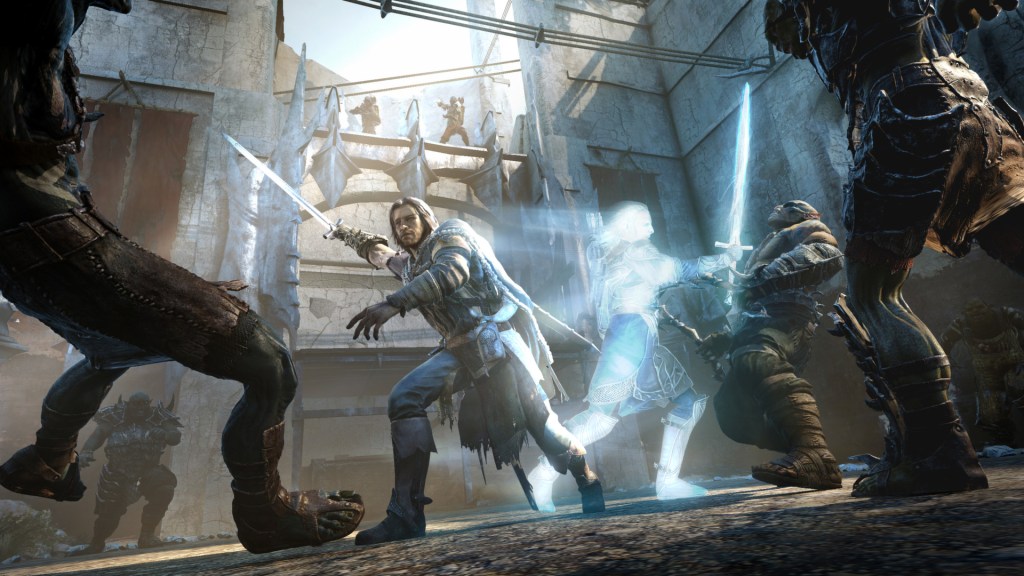
19. Middle-Earth: Shadow of Mordor
While people weren’t exactly upset by the prospect of an open-world Lord of the Rings game, it’s fair to say that expectations for Shadow of Mordor were modest. Of course, that was before we knew the extent of the game’s brilliant Nemesis System.
We’ll soon discuss other open-world games that benefit from making you feel that something dangerous could be around any corner, but few other open-world games tie that feeling into their narrative quite like Shadow of Mordor does. Yes, the game’s use of deep cut LOTR lore is impressive, but it’s really the stories that you make as you establish and end rivalries that you’ll remember long after the credits roll. It also doesn’t hurt that those rivalry-driven combat sequences are bolstered by a brilliantly utilized Arkham-like fighting system.
For what it’s worth, Monolith Productions’ other incredible licensed open-world game (Mad Max) also nearly made this list. – MB
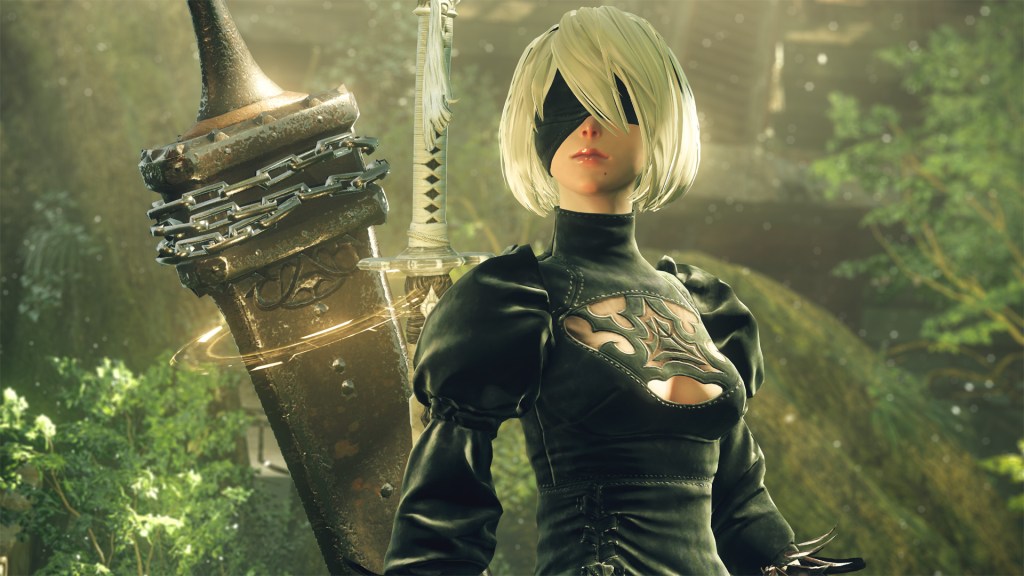
18. NieR: Automata
At first, NieR: Automata starts like any other open-world adventure that lets players wander different biomes, fight enemies, and accept side quests. However, as the game progresses, the story delves into surprising, introspective twists that are guaranteed to surprise you. NieR Automata also utilizes a complex combat system that is rarely seen outside of more linear action titles that can better account for the possibilities such a system may result in.
Not everything is as it seems in Nier Automata, and each subsequent New Game+ run reveals just a little more about the story’s many secrets and themes. This is quite simply one of the best examples of a developer using the open-world genre to tell a story as complex and diverse as the world itself. – AG
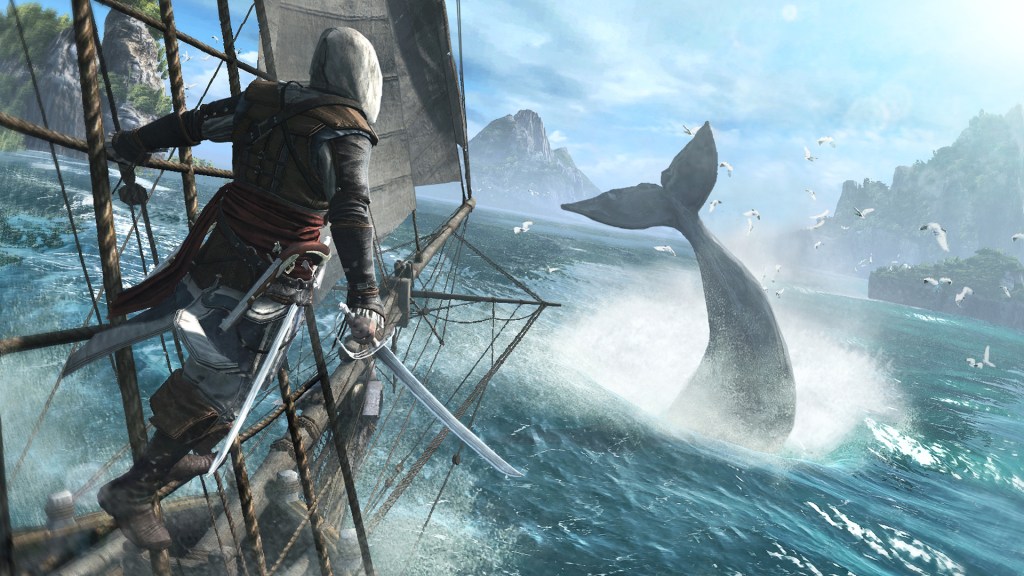
17. Assassin’s Creed IV: Black Flag
Assassin’s Creed 2 may be the most influential Assassin’s Creed game, but it’s not the AC game that leaves you singing sea shanties at the mere mention of its name.
Somewhere between Assassin Creed’s shaky start and the series’ eventual transition into a more RPG-like franchise lies this game that reminded us of the power of the perfect setting in an open-world experience. While there are times when I wish Black Flag offered a little more variety in its missions and combat, few open-world games have come close to the thrill of sailing the high seas and realizing that it’s a pirate’s life for you after all. – MB

16. Horizon Zero Dawn
When playing Horizon Zero Dawn, don’t be surprised if you suddenly feel a strange sense of culture shock. After all, it’s hard to think of another game that so brilliantly weaves so much mythology and environmental storytelling into its world, and it’s even hard to find a game that leaves you feeling like a stranger in a strange land even after you’ve spent dozens of hours with it.
There is a visceral pleasure to watching mechanical monstrosities terrorize villagers in a world that feels so close (yet so far) from our own, but this game truly shines whenever you take it upon yourself to dig a little deeper. Maybe aspects of Horizon Zero Dawn’s open-world gameplay played it a bit too safe, but the quality of its lore, world, and characters immediately set it apart from nearly everything else out there. – MB
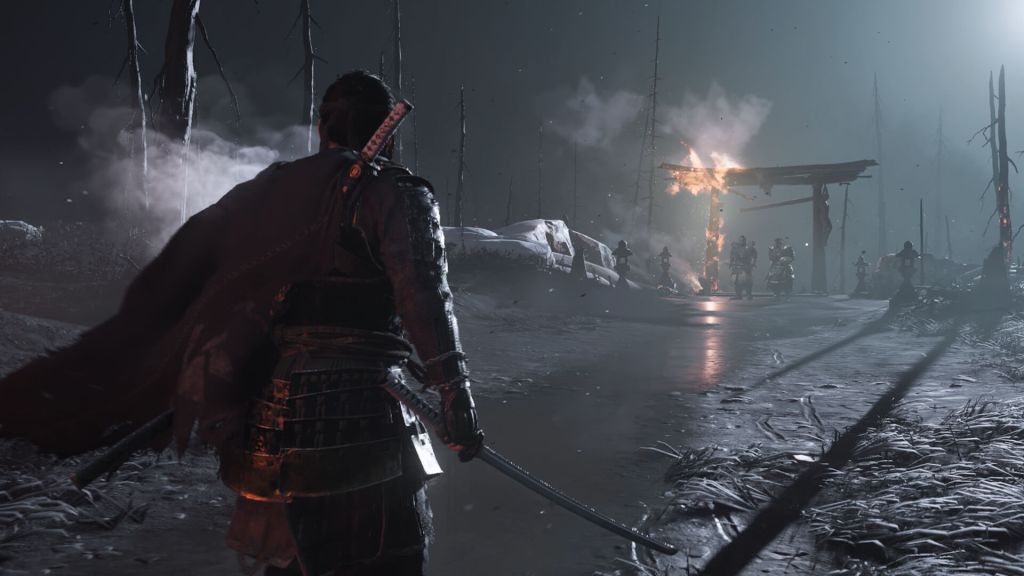
15. Ghost of Tsushima
Ghost of Tsushima follows the adventures of a samurai during the Mongol invasion of Japan (the titular Isle of Tsushima, to be precise). The game is, in a word, beautiful. Its scenic vistas hide a variety of side activities that encourage audiences to absorb the beauty of nature. Moreover, Ghost of Tsushima encourages players to approach combat and missions in multiple ways while also weaving those decisions into a narrative where honor clashes with survival.
Akira Kurosawa never directed a video game, but Ghost of Tsushima‘s stunning open-world is a surprisingly accurate realization of that dream prospect. – AG
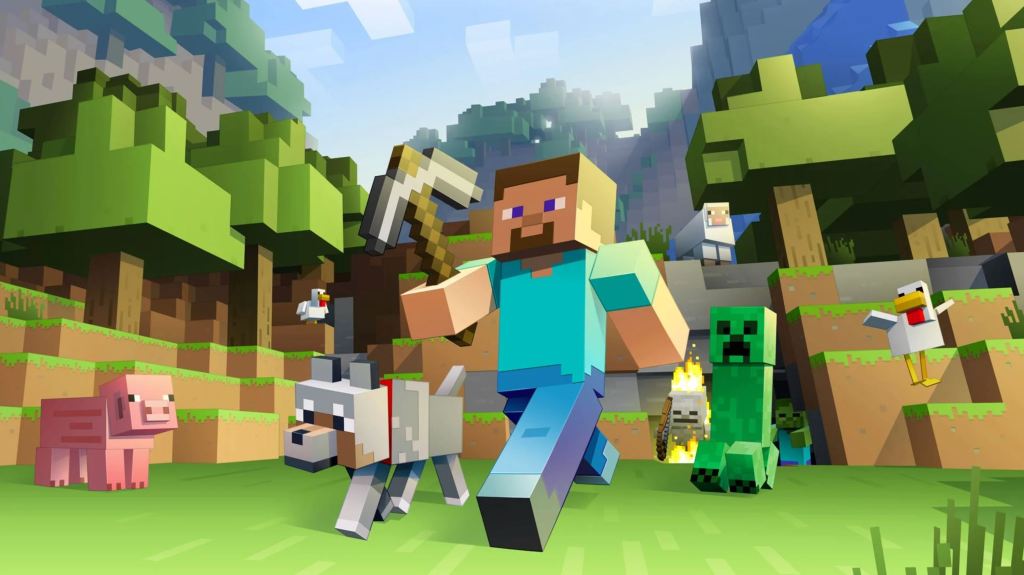
14. Minecraft
In Minecraft, you kind of have to find ways to make your own fun. While the game has a set goal, players are free to pursue it (or ignore it) as they see fit. Do you strip mine a mountain for diamonds, or do you create a farm? If for whatever reason you find yourself bored with solo pursuits, you can always hop on another server and explore its randomly generated with friends that can help you build giant, digital monuments or pursue any other number of imaginative goals. Even if Minecraft wasn’t updated with such regularity, the game is so full of mods that it has literally infinite entertainment potential.
Minecraft is that kind of pure sandbox open-world experience that recognizes that there are times when all you need to make memories is an ax, a sword, and an unfettered imagination. – AG
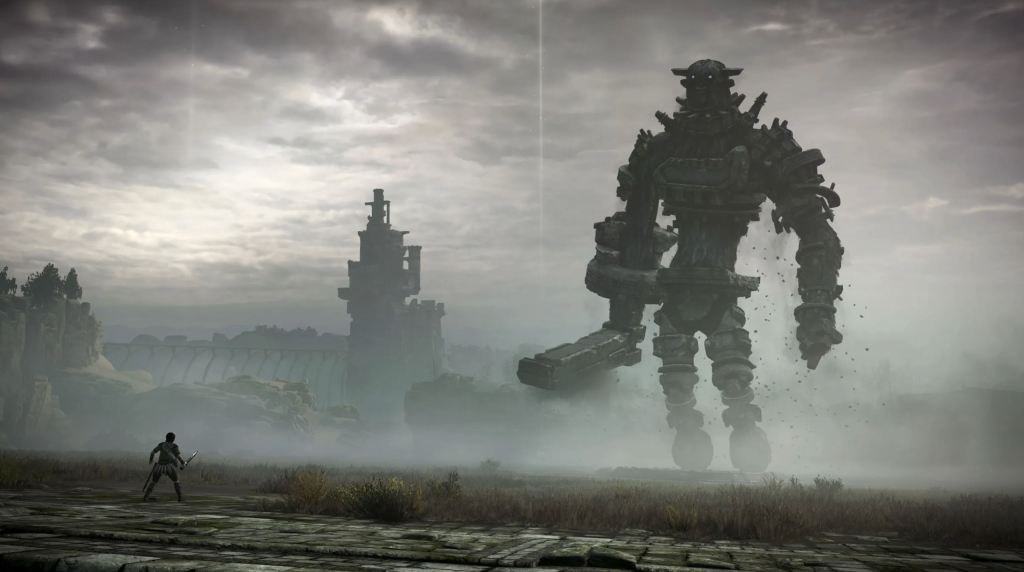
13. Shadow of the Colossus
Many open-world titles either don’t feature enough content to justify their size. Others go overboard and try to include a little too much content. Shadow of the Colossus is sparse by design, but it never feels that way thanks to its art, clever level design, and soundscape. The game nails a foreboding sense of isolation to accentuate the titular colossi, which serve as both boss battles and climbing puzzles. Each creature is a sight to behold and evokes both fear and pity.
Thanks to its design choices, Shadow of the Colossus has long been cited in that “video games are art” debate that never seems to go away. It’s also a fantastic example of how open-world games aren’t limited to the formula they’re sometimes reduced to. – AG

12. Subnautica
The problem with a lot of survival games is that you end up getting so caught up in the process of staying alive that you start to wonder what you’re supposed to be living for. The thrill of trying to beat the odds is exciting in its own right, but the whole arrangement sometimes falls apart when you start to ask yourself why you’re even bothering to see the next day in the first place.
That’s the magic of Subnautica. Continuing to survive means getting to dive a little deeper into its almost alien world filled with wonders, threats, and pleasures that somehow all logically occupy it. I’ve heard many some call Subnautica one of the best open-world horror games ever made, and it’s certainly hard to deny how intimidating the game can be. Yet, it’s a testament to the power of this game’s setting that you’re rarely too scared to stop wondering what else is out there. – MB
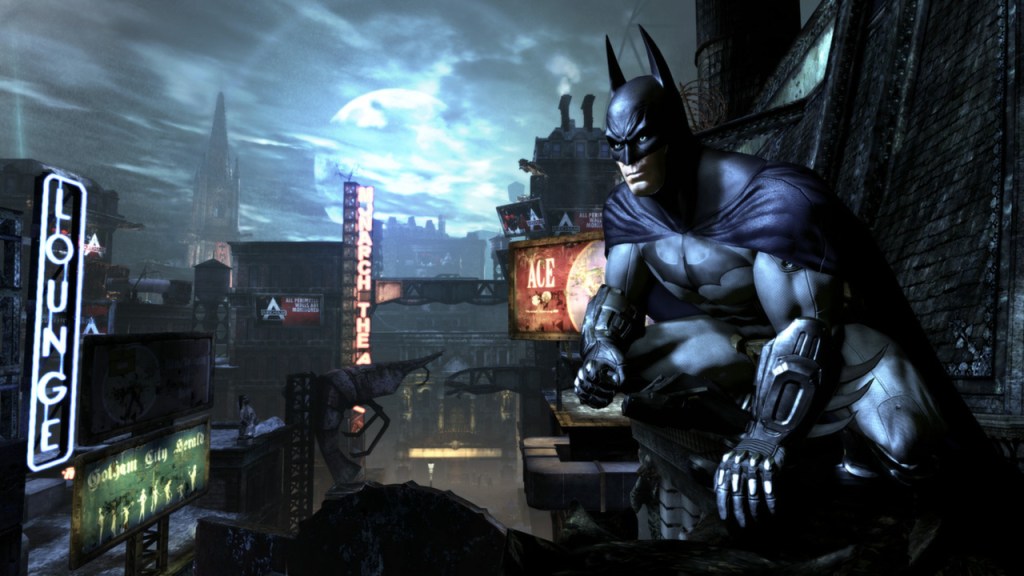
11. Batman: Arkham City
Batman: Arkham Asylum introduced many to the potential of a gritty and somewhat realistic Batman video game, but Batman: Arkham City truly capitalized on the potential of that concept. Unlike the first title, which takes place in the grimy halls of Arkham Asylum, Arkham City opens things up and lets players explore a beautifully realized version of Gotham City. Moreover, the game’s world is populated with all the supervillains, gadgets, and musical stings fans associate with the caped crusader. If you’ve ever wondered what it would be like if Batman was the star of his own Escape From New York adventure, you’ll be happy to know this game makes the most out of that incredible premise.
Thanks to a satisfying combat system, gripping story, and pitch-perfect voice acting, Batman: Arkham City is widely regarded as perhaps the best superhero game ever made. Even the more ambitious Arkham Knight struggled to recreate the magic of this game. – AG
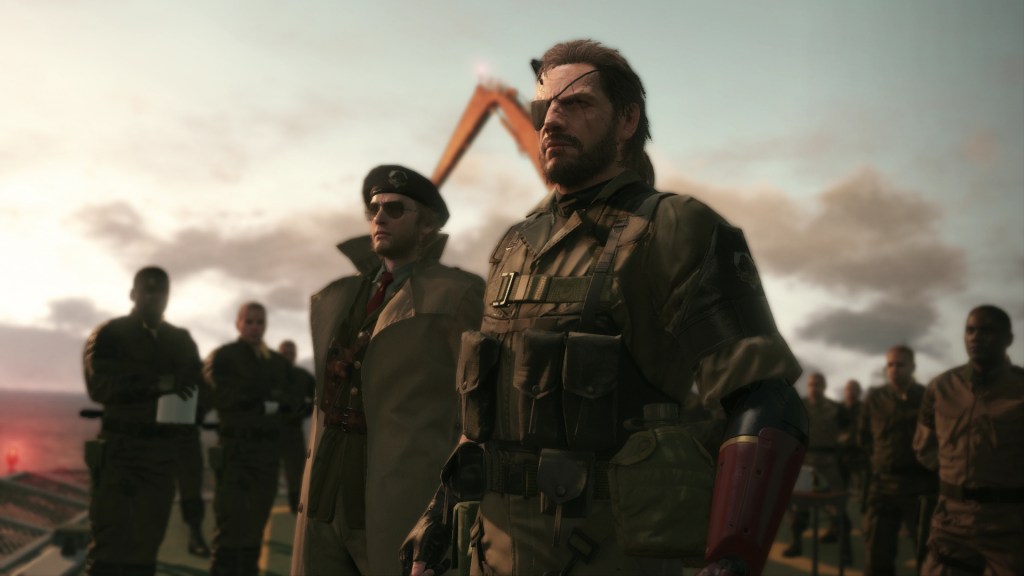
10. Metal Gear Solid V: The Phantom Pain
At first, I wasn’t really sold on the idea of an open-world Metal Gear game. My initial time with Phantom Pain also didn’t do a lot to convince me that the things that made prior MGS games great necessarily needed a larger world to work. Indeed, The Phantom Pain ends up being a far more structured open-world game that doesn’t even really strive for the “living world” concept seen in other genre titles.
Interestingly, that happens to also be the very quality that makes this such an incredible open-world experience. The Phantom Pain doesn’t offer the biggest or liveliest world, but it does offer the perfect environment for a Metal Gear game. Every aspect of The Phantom Pain’s world was cleverly built to encourage you to explore the various tactical options made available to you. Here is an open-world game that is more interested in forcing you to answer the question “How do you make that happen?” rather than “Where can you go?” – MB
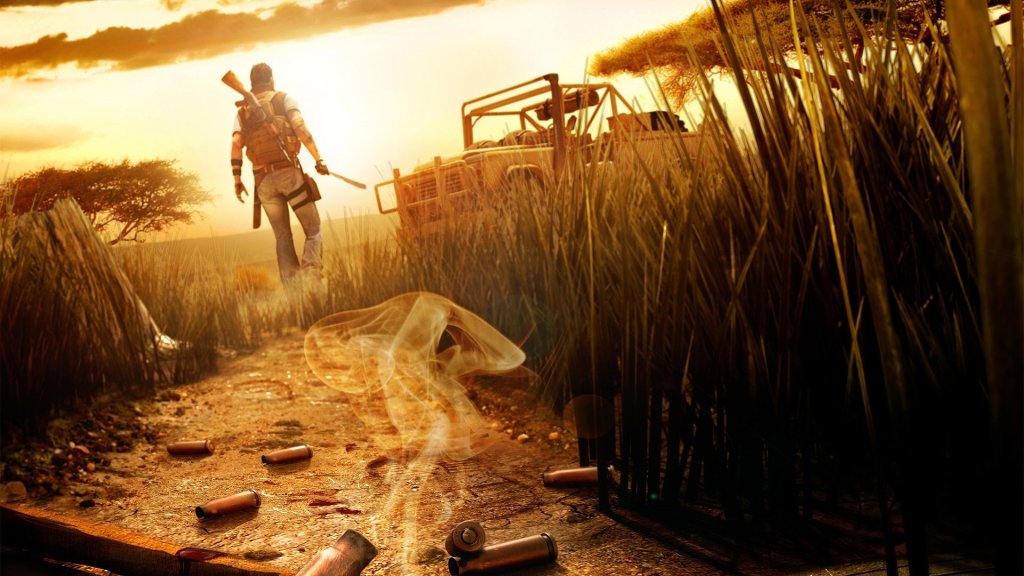
9. Far Cry 2
Former Kotaku writer Harper Jay put it best when they bemoaned Far Cry 5’s “sanitized gameplay” and suggested that “[Ubisoft] should look back to Far Cry 2, a game that wasn’t afraid to let things break” for inspiration. Of course, it’s frustratingly clear at this point that Ubisoft will likely never greenlight another game quite like Far Cry 2.
Far Cry 2’s world is constantly trying to kill you. If the various bullets that are flying around don’t get you, malaria almost certainly will. Yet, unlike the many modern survival titles this gem clearly inspired, Far Cry 2 is still an action game above all else. It just happens to be a brilliant open-world action game that asks you to consider things like flammable environments, where enemies are likely to hide when the sun is too hot, and how to always make the most out of limited resources in order to overcome incredible odds. – MB
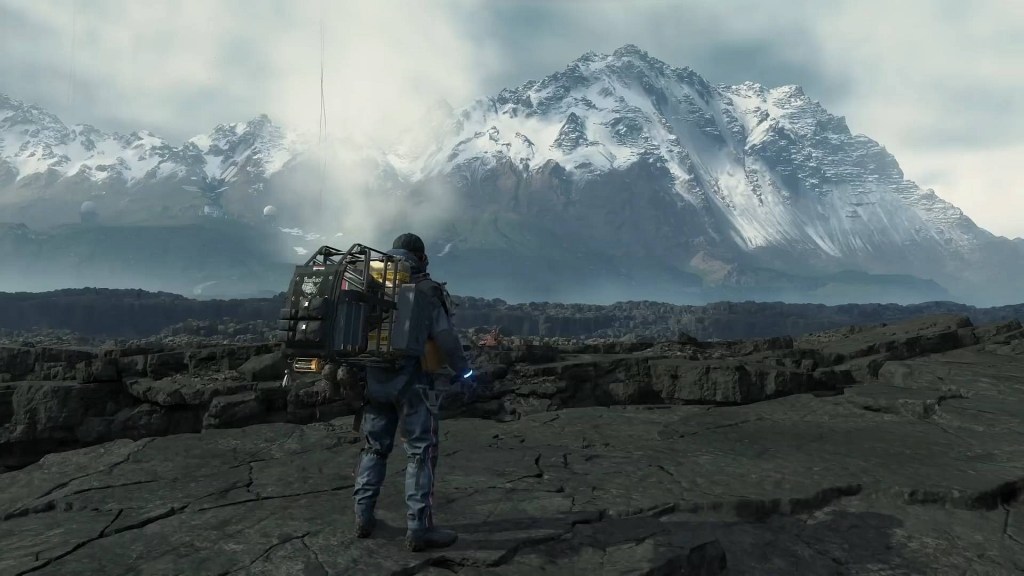
8. Death Stranding
In regards to Death Stranding, we once asked the question, “Do Games Need to Be Fun to Be Good?” That question really does tap into the heart of the entire Death Stranding experience. It’s a game where nothing comes easy and every task can feel like the start of a journey of a thousand miles.
That’s also why Death Stranding is such a brilliant example of this genre. Its desolate and sometimes hopeless world happens to be the perfect setting for a game designed to teach you to appreciate the value of little victories and human connections. You’ll fall, you’ll fail, and you’ll sometimes wonder whether you’re having any fun, but by the time you look back at the better world you left behind and how far you’ve come, you just might shed a tear. – MB
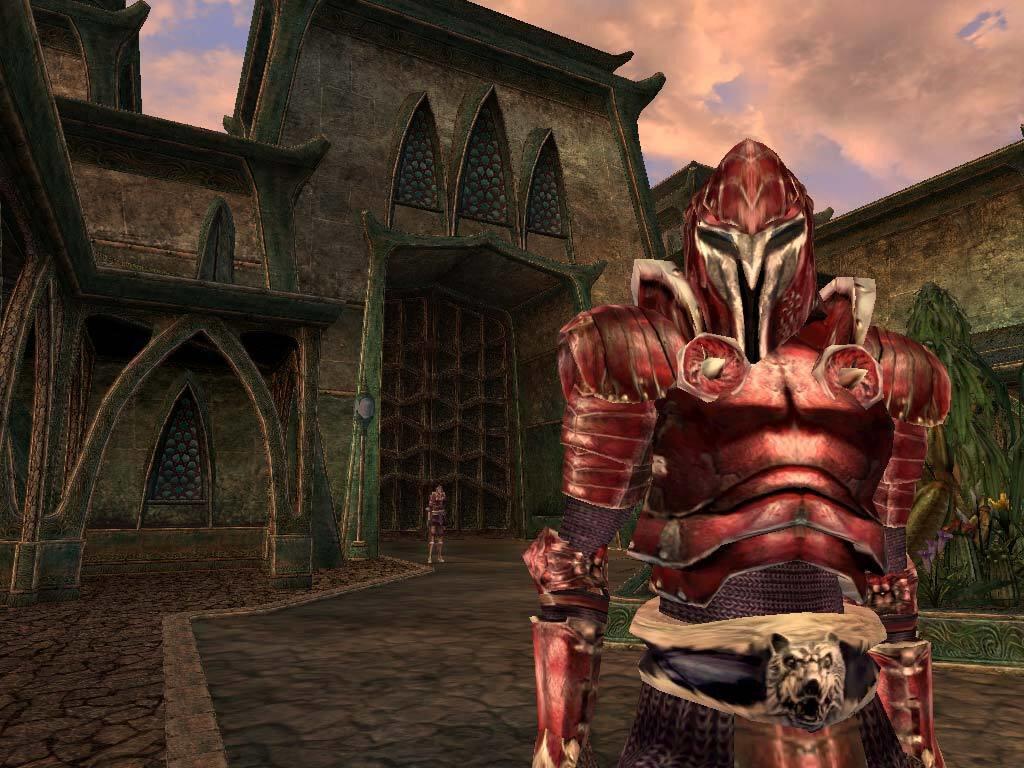
7. The Elder Scrolls 3: Morrowind
At a time when developers were simply dipping their toes into the waters of the open-world concept as we know it today, the team behind The Elder Scrolls 3: Morrowind took a different approach. They decided to make an open-world game that seemingly featured everything that they’ve ever wanted to do with their already epic RPGs. As a result, Morrowind can often be confusing, complicated, and remarkably user-unfriendly.
Yet, many of the qualities that you could use to criticize Morrowind could just as easily be used to explain why it’s such an important and incredible open-world experience. It’s an open-world RPG where you truly get to feel like you’re gradually growing your character and making a name for yourself in its beautiful, dangerous, and wonderfully weird world. Mods and fan updates can improve some of this game’s technical shortcomings, but there is no replacement for the ways that Morrowind makes you feel like you’ve truly been transported to a distant land where the only victories you’ll find are those that you make for yourself. – MB

6. Fallout New Vegas
Player choice is at the heart of the Fallout franchise, and Fallout: New Vegas offers more choices than any other entry into this franchise that redefined what video game role-playing really means. Players can solve almost every problem with their weapons, wits, or wallet, but the game’s gray morality remains a constant challenge. Many otherwise excellently designed characters and organizations in Fallout games are either overly good or mustache-twirlingly evil, but New Vegas blindsides players by ensuring that nothing is quite as it seems. There are choices in this game that go far beyond right and wrong, “A” or “B”, or color-coded moral compasses.
Fallout: New Vegas demonstrates what kind of magic can happen when game developers make a world’s inhabitants as morally flexible as the main character. – AG

5. Grand Theft Auto V
Like the rest of the entries into this legendary franchise, Grand Theft Auto 5 is essentially a gigantic crime simulator. Gamers can explore every back alley of its incredible world and absorb all the details that went into creating this overblown and satirical universe that somehow feels more real than it probably should. While GTA 5‘s return to a slightly more ridicicolus form of gameplay bolstered by a variety of side activities was certainly welcome, the thing that really elevates this game above its predecessors is its use of three protagonists. The concept of three protagonists in a GTA game could have been a gimmick, but our “heroes'” personalities and goals play off each other in a way that creates a thrilling narrative that would have been impossible to achieve with only one lead.
Many developers and publishers have tried to find their own GTA 5, but there are reasons why this game remains a best-seller nearly nine years after its debut. – AG
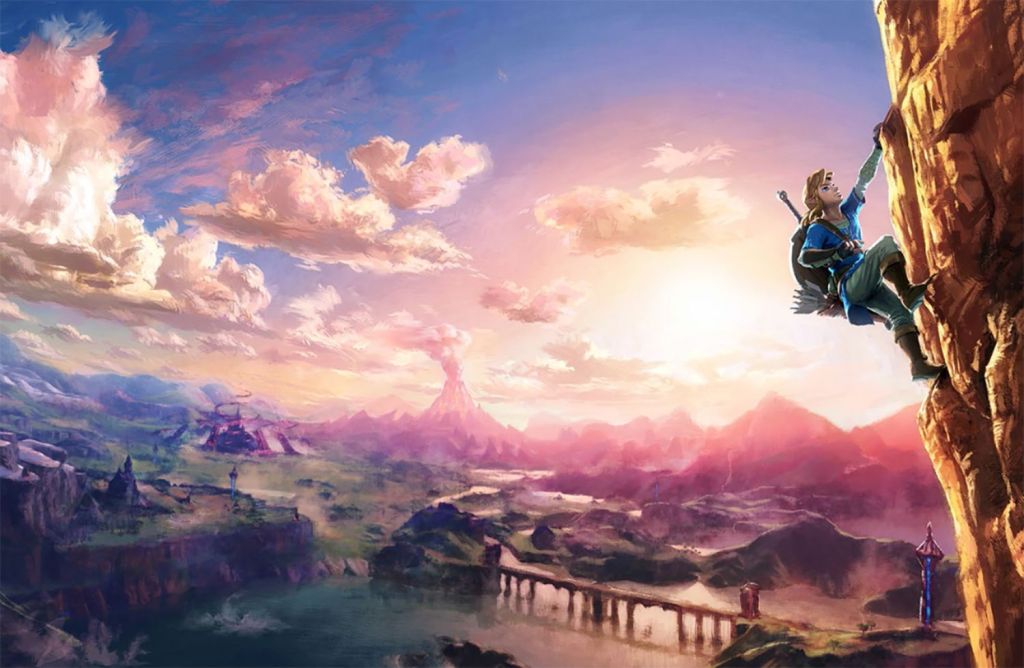
4. The Legend of Zelda: Breath of the Wild
The Legend of Zelda: Breath of the Wild was, pardon the pun, a breath of fresh air for the Zelda franchise. Audiences had complained about the ever-growing “handholdy” nature of the series, so Nintendo listened to those criticisms and developed a title that emphasized freedom and exploration. Players can go wherever they want, whenever they want, however they want. Not only is the world full of buried treasures and side quests, but it is also a physics playground that encourages players to find new ways to overcome obstacles and fight enemies.
Half the fun of The Legend of Zelda: Breath of the Wild is discovering what hides in the game’s nooks and crannies; the other half comes from trying to get there alive. – AG
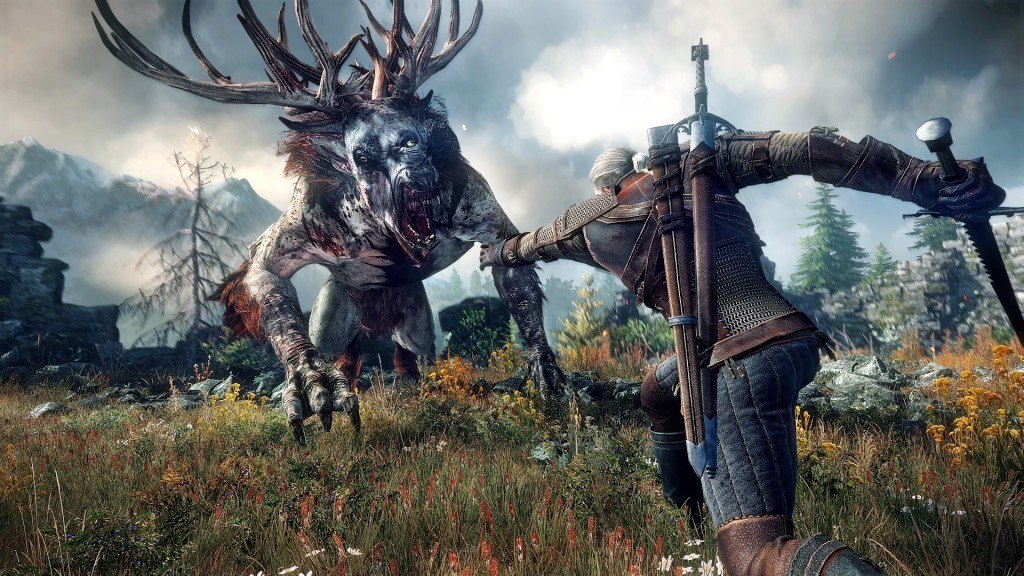
3. The Witcher 3: Wild Hunt
The Witcher 3 really spoiled us. One corner of this game’s open-world is bountiful and beautiful enough to justify being the setting for a separate game, just as most of this game’s characters could easily be the heroes and villains of their own RPG. Even Gwent proved to be good enough to become its own game.
Indeed, this game raised the bar for RPGs and open-world games in a way that often makes it hard to play other titles without finding your mind slowly drifting back towards this triumph. Maybe it’s unrealistic to expect other games to deliver what this game did, but there’s no way to scrub your memories of this game from your brain just as there is no way to purge the way it made you feel out of your heart. – MB

2. Red Dead Redemption 2
Red Dead Redemption was an incredible “GTA with horses” experience that expertly invoked the thrills of high-octane Western films like The Good, The Bad, and The Ugly, High Noon, and The Magnificent Seven. Red Dead Redemption 2 is something else entirely. It’s a much more methodical, critical, and character-driven Western that feels closer to Heaven’s Gate, McCabe & Mrs. Miller, and Unforgiven. That sudden shift in tone (as well as the game’s more “realistic” controls and mechanics) inspired a lot of people to ride away from RDR 2 and never look back.
However, I truly believe that every year since RDR 2’s release has only cemented its status as a masterpiece. It captures the romanticism and horror of the old west through its stunningly beautiful open world and its emotionally complex story devoid of easy answers and simple characters. This is one of the rare open-world games that feels exciting to simply exist in. Some of the game’s best moments occur when you’re simply riding between adventures that would have been the highlights of other open-world titles. – MB

1. Elden Ring
Since its earliest days, the driving force behind the evolution of the open-world genre has been “go bigger.” Not long after a major new open-world game is announced, people rush to figure out how big its map is and how much there is to do in it. That kind of escalation is natural, but there are times when it feels like open-world designers became so obsessed with going bigger that they’ve lost sight of where the whole thing started. As quantity has gradually morphed into quality in the minds of some, the process of exploring an open world too often feels like a chore best left to dedicated completionists.
That’s the amazing thing about Elden Ring. It’s somehow both one of the larger open-world games ever made in terms of its wealth of content and the rare modern open-world title that taps into the heart of what makes this genre so special in the first place.
At the end of the day, Elden Ring is a game designed to make you constantly ask the question “Oh, what’s that?” I never thought a modern game could recreate that feeling I got when I played GTA 3 or Morrowind for the first time and tried to process that such a thing was even possible, but I constantly encountered that feeling in Elden Ring. Just when I thought I had seen most of what the game had to offer, I would read about someone finding some item, boss, area, or quest that I had somehow missed during my 100-hour playthrough. It’s bold for an open-world developer to fill their game with things most people may never see, but that’s the kind of thing you can get away with when the rest of your game is designed to make whatever adventure a player chooses to embark upon feel substantial.
Elden Ring manages to combine the purity of foundational open-world games with the scope of more modern entries into that genre in a way that makes it surprisingly easy to call it the absolute best in its class. – MB
The post 25 Best Open-World Games Ever appeared first on Den of Geek.
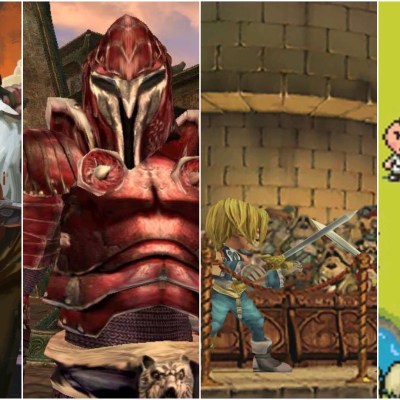

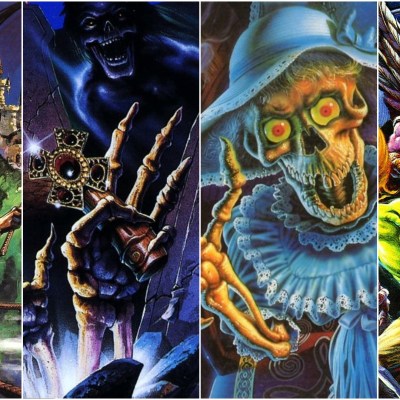
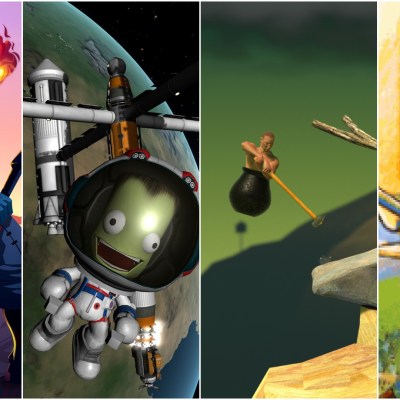


0 Commentaires